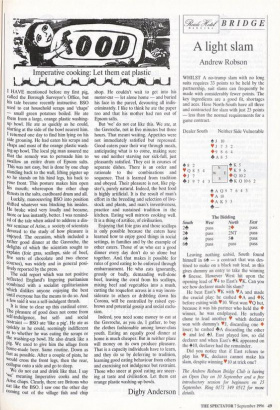in L Imperative cooking: Let them eat plastic
I HAVE mentioned before my first pig, called the Borough Surveyor's Office, but his tale became recently instructive. BSO used to eat household scraps and 'chaps' — small green potatoes boiled. He ate them from a large, orange plastic washing- up bowl. He ate as quickly as he could, starting at the side of the bowl nearest him. I returned one day to find him lying on his side groaning. He had eaten his scraps and chaps and most of the orange plastic wash- mg-up bowl. The local pig man assured me that the remedy was to persuade him to swallow an entire drum of Epsom salts. This was not easy, but is done by one chap standing back to the wall, lifting pigster up so he stands on his hind legs, his back to your front. This posture makes him open his mouth; whereupon the other chap thrusts in the Salts, cardboard drum and all.
Luckily, manoeuvring BSO into position shifted whatever was blocking his insides. He broke wind very loudly and became, more or less instantly, better. I was remind- ed of the tale when asked to address a din- ner seminar of Arise, a society of scientists devoted to the study of how pleasure is enjoyed. The occasion, which included a rather good dinner at the Gavroche, the delights of which the scientists sought to explain (foie gras, scallops, side of beef, five sorts of chocolate and two cheese courses), was widely and in general posi- tively reported by the press. The odd report which was not positive reflected England's lingering puritanism combined with a socialist egalitarianism which dislikes anyone enjoying the best until everyone has the means to do so. And a few said it was a self-indulgent thrash.
It is time to clear up this cardinal error. The pleasure of good does not come from self-indulgence, but self- and social restraint — BSO ate 'like a pig'. He ate as quickly as he could, seemingly indifferent as to whether he was eating the scraps or the washing-up bowl. He also drank like a pig. We used to give him the ullage from home-made beer. Same routine. Down as fast as possible. After a couple of pints, he would cross the front legs, then the rear, collapse onto a side and go to sleep.
, We do not eat and drink like that. I say We meaning Imperative cooks and the Arise chaps. Clearly, there are Britons who eat like the BSO. I saw one the other day corning out of the village fish and chip shop. He couldn't wait to get into his motor-car — let alone home — and buried his face in the parcel, devouring all indis- criminately. I like to think he ate the paper too and that his mother had run out of Epsom salts.
But 'we' do not eat like this. We ate, at the Gavroche, not in five minutes but three hours. That meant waiting. Appetites were not immediately satisfied but repressed. Good eaters pace their way through meals, anticipating what is to come, making sure we end neither starving nor sick-full, just pleasantly satisfied. They eat in courses of separate dishes. There is an order and rationale to the combinations and sequence. That is learned from tradition and obeyed. Their pleasure is not, like pig- ster's, purely natural. Indeed, the best food is highly artificial. It is the result of man's effort in the breeding and selection of live- stock and plants, and man's inventiveness, practice and sustained tradition in the kitchen. Eating well mirrors cooking well. It is a thing of artifice, of civilisation.
Enjoying that foie gras and those scallops is only possible because the eaters have learned how to enjoy good things in social settings, in families and by the example of other eaters. Those of us who eat a good dinner every day don't do so alone but together. And, that makes it possible for rules of good eating to be enforced through embarrassment. He who eats ignorantly, grossly or badly, demanding well-done beef, leaving the coral from his scallops, mixing beef and vegetables into a mush, cutting the roquefort across in a way incon- siderate to others or dribbling down his Corona, will be controlled by raised eye- brows and potential gossip and social exclu- sion.
Indeed, you need some money to eat at the Gavroche, as you do, I gather, to buy the clothes fashionable among lower-class youth. Eating an equally good dinner at home is much cheaper. But in neither place will money on its own produce pleasure. That is a capacity individuals have to learn, and they do so by deferring to tradition, learning good eating behaviour from others and exercising not indulgence but restraint. Those who sneer at good eating are sneer- ing at taste and civilisation. Let them eat orange plastic washing-up bowls.
Digby Anderson


























































 Previous page
Previous page